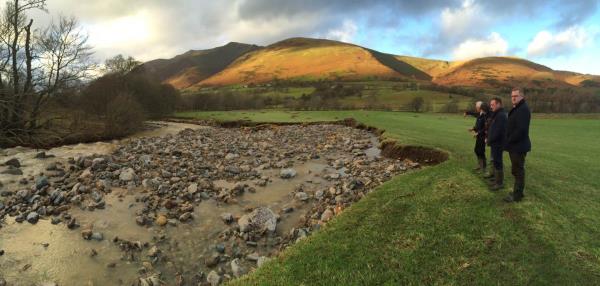He writes:
Hundreds of acres of prime productive agriculture land have been submerged by water or left with debris and gravel deposited on them following storms Desmond, Eva and Frank.
More of our staff blogs...
 | Guy Smith, NFU Vice President - The BPS haves... and have-nots |
 | NFU food chain adviser Christine McDowell - A Sainsbury's climb-down, or realism? |
 | Head of food and farming, Phil Bicknell - Key points as the AHDB reviews its work |
 | Chief renewable energy and climate adviser Jonathan Scurlock - On the road to renewable energy |
| Economics adviser Lucia Zitti - NFU at forefront of PM's EU reform proposals | |
| Livestock board chairman Charles Sercombe - Tesco signals commitment on British lamb |
The impact on farms in Cumbria and Lancashire, as well as other parts of North England, has been extremely distressing.
Our members are a resilient group and many have experienced flooding like this before. Dealing with such devastation on the run up to and during Christmas is extremely tough on family life, but there is a real determination not to be beaten by this extreme weather. The strength of community spirit has been a shining light in such a dark time for many.
We know how important it is for members to assess the damage as soon as possible and begin the clean-up operation so farm life can get back to normal.
Since the floods first hit in early December, our teams of staff have been out speaking to members, offering them practical advice where needed and keeping them informed of the support available. Organisations such as RABI, Addington Fund and the Farm Community Network have all given support to farmers that have requested help. I’ve added it up and I think our NFU team of 40 have put in more than 1,000 man hours since the first farms were flooded, whether it be direct help to affected farmers or lobbying on behalf of members
We’ve been listening to what you’ve been telling us about how your businesses have been impacted. Whether it’s the huge amount of gravel washed onto fields, fallen livestock, stonewalls being decimated or crops being devastated by floodwater we know you need specific support to put things right.
We’ve taken your voice directly to Defra. We’ve explained how the floods have impacted on your farm business and what you need to put things right. As a result the Farm Recovery Fund has been set up, giving flooded farmers in Cumbria, Lancashire, Northumberland and Yorkshire access to payments of up to £20,000. This is to help restore productive land and farm vehicle access and to repair boundaries and field drainage.
We continue to lobby the Rural Payments Agency to pay stricken farm businesses their Basic Payment Scheme (BPS) monies as soon as possible. With farm buildings, equipment and infrastructure in need of repair or replacement farmers need to have access to their BPS payment now.
The Environment Agency has responded to our call to be pragmatic on the removal of stone and debris, allowing farmers to stockpile gravel to be used on tracks or paths in the future.
I’ve been speaking to many members over the past few weeks and what they tell me they need now is a co-ordinated approach to dealing with the clean-up operation. They’d also believe the RPA need to take a pragmatic approach to the 2016 BPS applications where land has been impacted by the flooding. We’ll be taking this message to local and central Government in the coming days, weeks and months. Members have also requested help to access the Farming Recovery Fund (FRF) and to support this we have moved additional staff to the region to help farmers complete their applications.
I’m determined farmers are treated fairly as they get their businesses back on track. And in the future we must be empowered to use the best available tools to cope with extreme weather.
